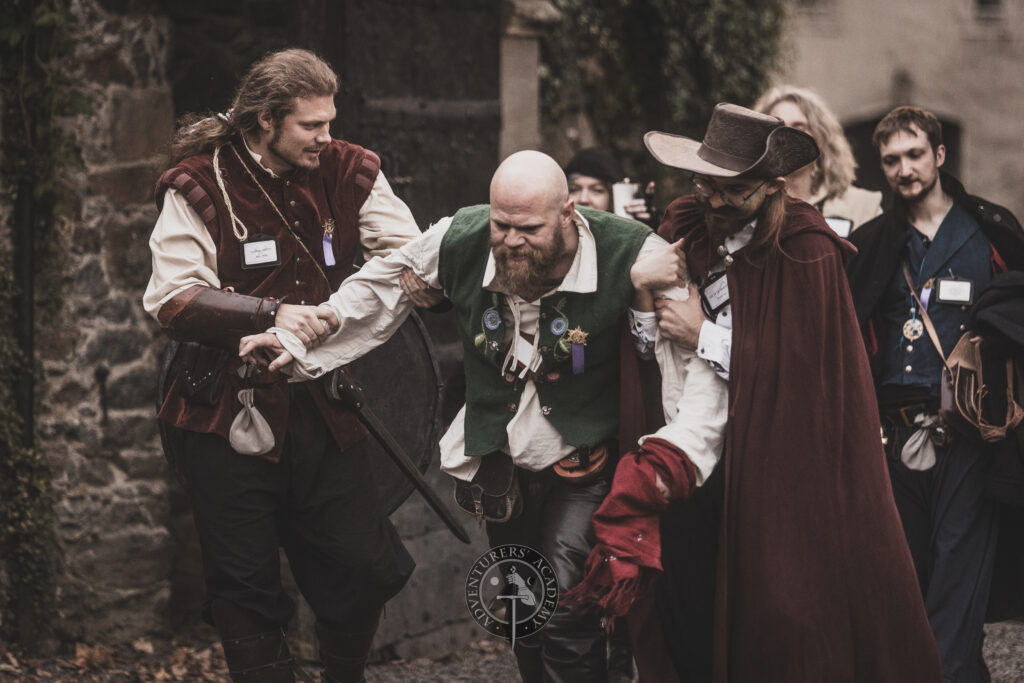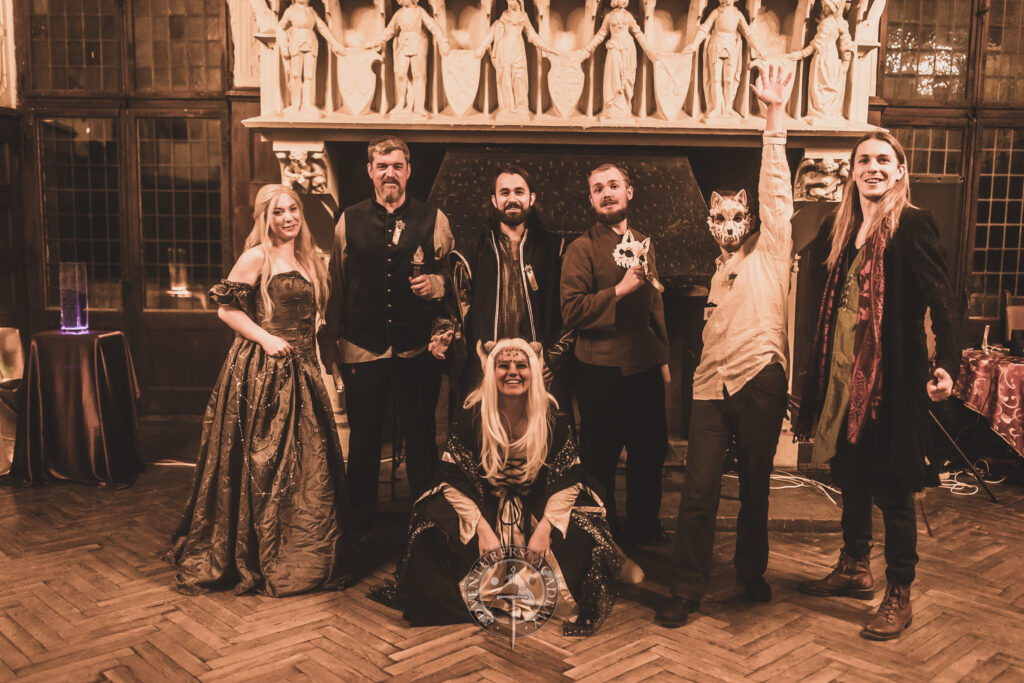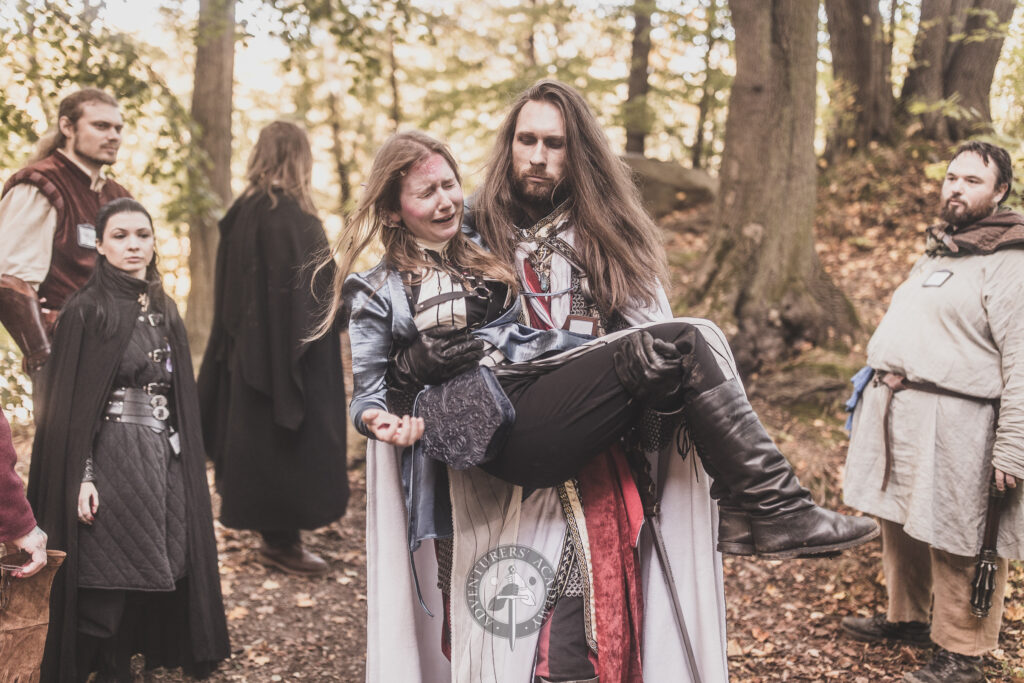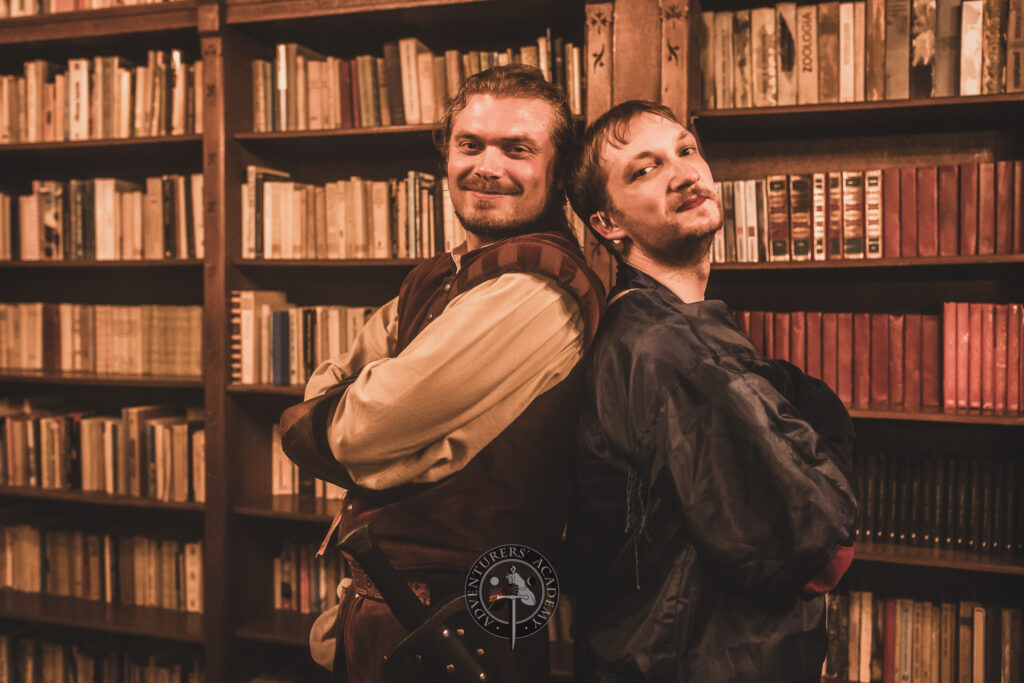"We put the 'fun' in Dysfunctional Adventuring Party!"
What is this "larp" thing?
Larp (live-action roleplay) is a collaborative storytelling experience where the players embody characters and interact with the game world and with one another in a spontaneous, unscripted way. There is no audience - everyone is a participant.
Setting
Have you ever wanted to be the Chosen One?
A hero or a villain in a larger-than-life story?
Have you ever wondered what it would be like to change the world?
A hero or a villain in a larger-than-life story?
Have you ever wondered what it would be like to change the world?
Adventurers' Academy is set in a fictional world whose inhabitants are torn between two opposing forces: Creation and Destruction. In exchange for loyalty towards one of these Alignments, the all-powerful Divinities bestow special powers upon those who serve them. That is how allies of Creation and Destruction are born, blessed with a larger-than-life destiny and burdened with their family’s and nation’s expectations towards the future. As they set off on the journey to greatness, all they have is the favour of their Divinity to trust in and the words of their prophecy to guide them.
Our game starts when the Chosen Ones from both Alignments meet at the gates to the famous Adventurers’ Academy, the place that will forge them into the Heroes and Villains they are meant to become. Once they step through the doorway, their lives will change forever.
There will be mystery, danger, joy and adventure; allies and enemies, friends for life and rivals with a deadly grudge; destinies will clash, faith will be tested, and through all this a new future will be forged.
This is, after all, how legends are born.
Our game starts when the Chosen Ones from both Alignments meet at the gates to the famous Adventurers’ Academy, the place that will forge them into the Heroes and Villains they are meant to become. Once they step through the doorway, their lives will change forever.
There will be mystery, danger, joy and adventure; allies and enemies, friends for life and rivals with a deadly grudge; destinies will clash, faith will be tested, and through all this a new future will be forged.
This is, after all, how legends are born.
Casting and Characters
New Players
New players are cast as first-year students at the Academy. They come from all possible walks of life: kings and beggars, thieves and merchants, young, old, and everything in between.
Having only recently found out that they have a destiny to fulfill, they are summoned to the legendary learning place for future heroes and villains, and they all start at level 1.
After the sign-up, each new player will receive a casting form, in which they will be able to tell us which Profession, Kin and Land they'd like to represent.
Having only recently found out that they have a destiny to fulfill, they are summoned to the legendary learning place for future heroes and villains, and they all start at level 1.
After the sign-up, each new player will receive a casting form, in which they will be able to tell us which Profession, Kin and Land they'd like to represent.
After the casting, the Writing Team will create a full character sheet for each player, tailored to the player's wishes.
NEW PLAYERS WILL:
* have secret information from their Land and/or faction;
* have their own goals and agendas;
* discover their place among the Chosen Ones - will they be claimed by Creation or Destruction?
* meet their Level 2 peers and forge alliances - or make enemies;
* form their own adventuring parties - or be invited into the existing ones;
* find a mentor who will help them on their road to greatness;
* dig into secrets which their Level 2 peers (and perhaps some of the Instructors) would rather keep buried;
* forge alliances to strengthen their Land - or cause the downfall of another;
* meet a whole range of interesting NPCs and forge alliances or animosities;
* join an adventure of their lifetime!
NEW PLAYERS WILL:
* have secret information from their Land and/or faction;
* have their own goals and agendas;
* discover their place among the Chosen Ones - will they be claimed by Creation or Destruction?
* meet their Level 2 peers and forge alliances - or make enemies;
* form their own adventuring parties - or be invited into the existing ones;
* find a mentor who will help them on their road to greatness;
* dig into secrets which their Level 2 peers (and perhaps some of the Instructors) would rather keep buried;
* forge alliances to strengthen their Land - or cause the downfall of another;
* meet a whole range of interesting NPCs and forge alliances or animosities;
* join an adventure of their lifetime!
Returning Players
Returning players will find that their students advance to level 2, which comes with cool new powers, but also additional responsibilities - including mentoring the newcomers.
The Writing Team will look at the questionnaires sent after Episode 1 and prepare updated character sheets for each returning player.
Their actions in Episode 1 sent ripples across the world. What has changed? What remains the same?
RETURNING PLAYERS WILL:
* have secret information about the Academy and the world;
* delve deeper into their character's background and development;
* uncover secrets about their destiny - and perhaps the Divinity they're aligned with;
* strengthen their adventuring parties;
* develop their skills and face their weaknesses;
* meet new Chosen Ones and decide whether they are potential allies - or enemies;
* discover how their actions from Episode 2 influenced their Land - and the world;
* forge new alliances and either strengthen the existing ones - or double-cross them;
* work towards the fulfillment of their adventuring party's contact;
* continue the adventure of their lifetime!
The Writing Team will look at the questionnaires sent after Episode 1 and prepare updated character sheets for each returning player.
Their actions in Episode 1 sent ripples across the world. What has changed? What remains the same?
RETURNING PLAYERS WILL:
* have secret information about the Academy and the world;
* delve deeper into their character's background and development;
* uncover secrets about their destiny - and perhaps the Divinity they're aligned with;
* strengthen their adventuring parties;
* develop their skills and face their weaknesses;
* meet new Chosen Ones and decide whether they are potential allies - or enemies;
* discover how their actions from Episode 2 influenced their Land - and the world;
* forge new alliances and either strengthen the existing ones - or double-cross them;
* work towards the fulfillment of their adventuring party's contact;
* continue the adventure of their lifetime!

Adventuring parties
No hero achieves greatness on their own, and no villain becomes a legend without their entourage. Most people won’t even acknowledge adventurers operating solo. During the game, your character will join an adventuring party, get invested in the personal stories of their peers, make enemies with rival parties, and alliances with like-minded ones. Parties are a great way to recruit talented people with unique skills, and go on quests that offer glory and rewards.

Character death
Character death does not have to mean the end of the game for the player and their character, but it does carry consequences. In the unlikely but possible scenario that your character meets a sticky end, visit the Organiser room and find out what happens next!
One thing is NOT possible - it is impossible for one player character to kill another player character. If your character dies, it will be due to NPC actions or due to the world's metaphysics reacting to your character's actions. There is no deadly PvP at the Academy.
One thing is NOT possible - it is impossible for one player character to kill another player character. If your character dies, it will be due to NPC actions or due to the world's metaphysics reacting to your character's actions. There is no deadly PvP at the Academy.

Tone
Much like the pen-and-paper games it pays tribute to, Adventurers’ Academy combines the light-heartedness of familiar tropes with the occasionally heavier weight of the characters’ journey. The tone will shift from scene to scene, and while a sprint through a monster-infested dungeon may elicit humour, death of a party member definitely should not.
We are going to co-create this experience together, players and crew alike, and we will build it on the following pillars:
1. Sincerity: we will all do our best to be on the same page as to the tone of the game. None of the tropes are played completely straight or completely satirically, and we will make sure that each character we write has both, space for humour and space for a deeper connection between the character and the player;
2. Collaboration: we will focus on two playstyles: play-to-lift and play-to-lose, which means being generous towards one another and distributing the spotlight evenly across the board.
Example of play-to-lift: you have won a duel with your enemy. It would be easy to say something like “Better luck next time, loser”, but imagine saying this instead: “Gotta admit, I broke quite a sweat there. I think I’ve earned myself a drink.” Not only are you acknowledging the challenge posed by your opponent, making them look badass despite their defeat, but you also make your own character look cool for having beaten a formidable foe rather than a “loser”.
Example of play-to-lose: you’re enjoying a bardic performance at the tavern when you notice an enemy slipping a drop of poison into your drink. You could call them out on it or ostensibly pour the drink out, or do any number of other “winning” moves; but you could also raise your glass in a toast to the performer, take a drink, and play the effects of the poisoning (push through the crowd to the exit and loudly “vomit” outside, pass out on the table, rasp for a healer etc.)
You will notice that in both examples, your actions don’t change the tone of the scene, but complement it. Which brings us to pillar number three:
3. Tonal integrity: we will do our best to read the room and adjust to the tone of the scene. Whether someone is playing for humour or seriousness, they are the tone-setter and we will respect the flow of the scene (or respectfully remove ourselves if the tone isn’t vibing with us at the moment).
Example 1: you encounter a scene where a group of adventurers discuss escorting a frightened peasant through a dangerous territory. The tone of the scene appears to be serious and the players look engaged and immersed. It’s probably not the best time to burst in and confront the bard about singing rude songs about your underwear.
Example 2: a group of adventurers is playing a game of “truth or dare” and clearly having a laugh. It’s probably not the best moment - or the best group - to crawl to while covered in blood to tell them about a dark prophecy that will doom them all.
A word on slapstick: there will inevitably be moments of comedy gold. It’s a game which plays on tropes: comedy is inevitable and, in truth, quite welcome. That being said, we’d like to avoid slapstick for the sake of slapstick. Keeping the tone light and turning everything into a joke are two completely different things, and while we support the former (within the tone of a given scene), we say a hard no to the latter. In larp, slapstick is often disruptive, immersion-breaking, and simply annoying. We’re sure we can all enjoy the game without it.
Finally, here’s a rule that encompasses all of the above: be kind and always assume the best intentions in people. We all mean well, and sometimes in our eagerness we misjudge. And that’s okay! Remember that you can always approach people off-game and clarify things. When you do, please do it with an open mind and the assumption that everybody involved had equally good intentions!
We are going to co-create this experience together, players and crew alike, and we will build it on the following pillars:
1. Sincerity: we will all do our best to be on the same page as to the tone of the game. None of the tropes are played completely straight or completely satirically, and we will make sure that each character we write has both, space for humour and space for a deeper connection between the character and the player;
2. Collaboration: we will focus on two playstyles: play-to-lift and play-to-lose, which means being generous towards one another and distributing the spotlight evenly across the board.
Example of play-to-lift: you have won a duel with your enemy. It would be easy to say something like “Better luck next time, loser”, but imagine saying this instead: “Gotta admit, I broke quite a sweat there. I think I’ve earned myself a drink.” Not only are you acknowledging the challenge posed by your opponent, making them look badass despite their defeat, but you also make your own character look cool for having beaten a formidable foe rather than a “loser”.
Example of play-to-lose: you’re enjoying a bardic performance at the tavern when you notice an enemy slipping a drop of poison into your drink. You could call them out on it or ostensibly pour the drink out, or do any number of other “winning” moves; but you could also raise your glass in a toast to the performer, take a drink, and play the effects of the poisoning (push through the crowd to the exit and loudly “vomit” outside, pass out on the table, rasp for a healer etc.)
You will notice that in both examples, your actions don’t change the tone of the scene, but complement it. Which brings us to pillar number three:
3. Tonal integrity: we will do our best to read the room and adjust to the tone of the scene. Whether someone is playing for humour or seriousness, they are the tone-setter and we will respect the flow of the scene (or respectfully remove ourselves if the tone isn’t vibing with us at the moment).
Example 1: you encounter a scene where a group of adventurers discuss escorting a frightened peasant through a dangerous territory. The tone of the scene appears to be serious and the players look engaged and immersed. It’s probably not the best time to burst in and confront the bard about singing rude songs about your underwear.
Example 2: a group of adventurers is playing a game of “truth or dare” and clearly having a laugh. It’s probably not the best moment - or the best group - to crawl to while covered in blood to tell them about a dark prophecy that will doom them all.
A word on slapstick: there will inevitably be moments of comedy gold. It’s a game which plays on tropes: comedy is inevitable and, in truth, quite welcome. That being said, we’d like to avoid slapstick for the sake of slapstick. Keeping the tone light and turning everything into a joke are two completely different things, and while we support the former (within the tone of a given scene), we say a hard no to the latter. In larp, slapstick is often disruptive, immersion-breaking, and simply annoying. We’re sure we can all enjoy the game without it.
Finally, here’s a rule that encompasses all of the above: be kind and always assume the best intentions in people. We all mean well, and sometimes in our eagerness we misjudge. And that’s okay! Remember that you can always approach people off-game and clarify things. When you do, please do it with an open mind and the assumption that everybody involved had equally good intentions!

